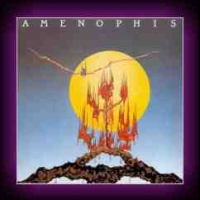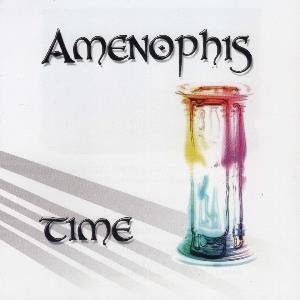The story of the German progressive rock act Amenophis is certainly a strange but by all means interesting one. The band started in 1977 as Tut Ench Amun named after a pharaoh. The brothers Stefan Roessmann (drums, keyboards, acoustic guitar, synthesizers) and Michael Roessmann (guitars, keyboards) were the ones who started it all. Early 1978 they were joined by Wolfgang Vollmuth on bass. Towards the end of the same year they called themselves after another pharaoh, namely Amenophis. After some line up changes the above mentioned trio decided, just before their break up, to record an album to show the outside world that they had existed. Over the years they had written thirty compositions, which meant five or six hours of music. However only four of them appeared on their eponymous album released in 1983. Strangely enough after they split up the album got picked up in several countries in the years to follow. In March 1987 this did led to the invitation of recording a follow up album. Well, of course this was an offer they couldn't refuse. However the album had to be made on short notice. Because of a serious illness, Stefan had to leave the group. He was replaced by drummer René Kius. Michael and Wolfgang also recruited Kurt Poppe on keyboards and Elke Moehrle on vocals to record their second album. Within two weeks time the album You And I was recorded and finally released in 1988. Due to the fact that the songs were more radio friendly and less progressive rock orientated, fans who bought their debut were not interested anymore and for that reason the album did not sell very well. The band had learned their lesson and started to write more progressive rock tunes again. In 1989 the band broke up for the second time. But in 2010 the band reunited for the second time. This led to the following line up of former members Michael Roessmann (lead guitar, acoustic guitars, vocals), Wolfgang Vollmuth (bass guitar, acoustic guitars, vocals) and Kurt Poppe (organ, piano, synthesizer, bass pedal) and new member Karsten Schubert (drums, percussion). Recordings of a new album began and finally in 2014 a third album could be welcomed. They named it Time and dedicated it to Stefan Roessmann, one of the founding members who was no more among the living, unfortunately. After hearing some track of this new album I asked the band for a review copy. They were kind enough to send one together with the band's debut album. This one was already reissued in 1992 with five bonus tracks. Listening to this release now I can only conclude they already had the talent to come up with some strong progressive rock tunes. Maybe not very original because the bands that ruled the progressive rock waves at the time could certainly be recognised as possible influences. Therefore it wasn't so strange to hear a part of Camel's Snowgoose album on The Last Requiem. Also the German progressive rock acts of that era, such as Anyone's Daughter, Eloy and Grobschnitt, might have influenced them. The five short bonus tracks, with French titles, were recorded before the band actually recorded the songs for their debut at their home studio. This was done to try out the newly bought equipment. To my surprise they sounded very good and can be described as being acoustic guitar and keyboards instrumentals with a new age ambient feel. The new album is of another level compared to their debut. Time can be regarded as being one of the best progressive rock albums made in Germany in 2014. Right from the opening piece The Overdue Overture the musicians manage to keep me focused until the final track Avalon. On the first track you could say the musicians sound like they are performing a classical piece of music played on the keyboards, electric and acoustic guitars. This instrumental is of such a high level that I can play it on and on. The same can be said about the track that comes next. The Sandglass Symphony is again a very melodic piece on which the electric guitar solo just sends shivers down my spine. Wow, this is just so good that you have to hear it to know that I am telling the truth. What to think of Some Times. The rhythm of the song is based on the tempo on which a train goes on the railways. Therefore the track starts and ends with the sound of a real locomotive. Music wise a Genesis song comes to mind from the days when Phil Collins replaced Peter Gabriel on vocals. Maybe you could label the following track Mrs April McMay as a poppy tune. But I have to admit I really did dig it all the way through. The female voice of Bettina Kumpfert-Moore as the newsreader towards the end of the song works very well in the over all sound of this track. A more classical approach can be noticed on the song that comes next. Beautiful acoustic guitar parts and orchestral keyboard passages are to blame for this style of music on You. A short intermission is next, simply titled Intermission. It's a strong short instrumental piece performed on the piano and synthesizers. The whole band is back in action on The Puppet Master. Well, they really know how to rock on this piece. The solos performed on the organ, synthesizer and electric guitar just sound fabulous. For the song that comes next they took a composition which was already born in January 1989. I am glad they dusted off Wheel Of Time, because it would have been a shame not to record such an excellent song. On this rather mellow tune you can hear Eveline Sriyani Enderle as a guest vocalist doing a duet with Wolfgang Vollmuth, the main vocalist on this release. The rather short Coming Home can be seen as the introduction for the final piece of music on the album. A kind of prologue to Avalon. Once again the voice of narrator Bettina Kumpfert-Moore can be heard before a majestic intro performed on the pipe organ starts The View. The first of the three parts Avalon is divided in. This epic track origins from December 1988. The song also features a bass solo that could have been played by Chris Squire during one of his solos performed at a Yes-concert. Their compositions Long Distance Runaround taken from Fragile (1971) certainly came to mind. Avalon is filled with bombastic parts performed on the keyboards and electric guitars. I will forgive them for using some harmonies of the classical composer Georg Händel, because it is integrated so well that it only lifts the song to an even higher level. After this track the album ends and you can only say; WOW!!! Did I really hear so much beautiful progressive rock music or am I dreaming? I was just speechless when the whole hour of amazing music came to an end on Time. I can only give my compliments to the musicians of Amenophis for delivering such a brilliant album after releasing no albums at all for so many years! Time is such a big step forward, you can hardly believe you are dealing with the same band that recorded their eponymous album in 1983. Let's hope the band comes up with a follow up album very soon which contains the same strong progressive rock music that can be heard on their latest effort. For now I can only give them the highest rating possible for this piece of art! ***/ ***** Henri Strik (edited by Astrid de Ronde) Where to buy? |

